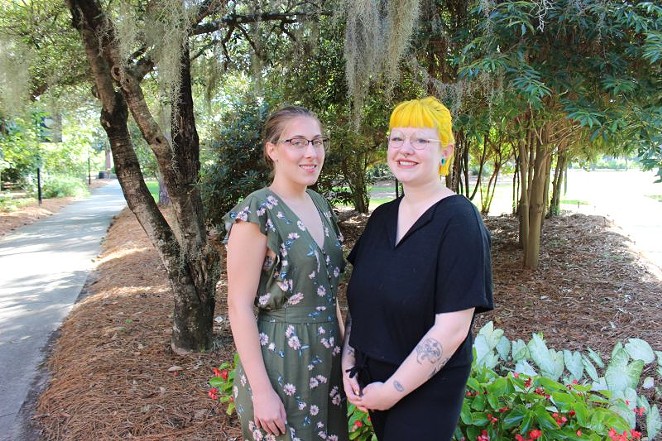ON Georgia Southern’s Armstrong campus, Feminists United is helping bring about some much-needed good.
The student organization recently partnered with the Homeless Period Project, based out of Greenville, South Carolina, to create a period pantry for community members in need.
“One of the reasons why we started it is because part of feminism is not just about learning and educating—it’s the practice, it’s the action,” explains senior Nora Cook. “We can talk all day about oppression, but if we’re not actively doing something about it, we’re complicit.”
At the launch party Aug. 21, students gathered to pack bags full of donated tampons, pads and liners. Cook explains that Feminists United is partnering with the Captain’s Cupboard food pantry to distribute the bags.
The Captain’s Cupboard is an initiative at Armstrong campus that serves as an emergency food program for students, faculty and staff. To participate in the program, the person completes a client request form. Feminists United, led by Cook and co-leader Ellie Weathers, are in the process of adding a question to the client request form that asks if the individual needs period products.
There will also be a donation box set up in the Student Union to allow students and community members alike to pick up items they need.
The issue of equal access to period products fits perfectly into Feminists United’s mission.
“We’re not talking about the stigma and the lack of resources of the trans and nonbinary people and people of color endure that is different than the issues that I as a white woman face when accessing reproductive needs,” says Cook.
One of the central issues Feminists United wants to tackle in their meetings this semester is the issue of what’s called “white feminism,” or feminism that doesn’t acknowledge the struggle of others, especially minorities.
“White feminism silences voices other than the cis heteronormative white female and only centers for their issues,” says Cook. “For example, with reproductive rights, I think that’s a really good example for what’s going on right now. A lot of the discussion is centered on women, particularly white women.”
Weathers explains the importance of intersectionality in feminism, meaning that every person is represented in this vision, regardless of race, gender or class. They also emphasize the importance of being open and willing to learn.
“From my perspective, everyone handles themselves differently,” they say. “There are those feminists that believe they don’t need to do the emotional labor to take it upon themselves to educate, because it can be a very triggering experience. But for me, personally, I try to take every opportunity to educate. We’re emphasizing that this is for everyone, it’s a safe space, you are allowed to come here and it’s okay if you don’t know everything. [But] it is your job to unlearn your racism and unlearn your sexism.”
Feminists United is structured more as a collective than as a typical board organization.
“When we had our official status based on the requirements of the school, we had a board consisting of a president, vice president, treasurer, so on,” says Cook. “But after feeling the consensus of our members, we moved to a looser collective status.”
“We want Feminists United to be accessible and we want it to be a safe space for everyone,” joins Weathers. “In an organization that would be structured like that, where it’s clearly people in charge, I can see how that might be jarring.”
“One of our main tenets is, of course, equality and equity,” says Cook. “Equality means we have a diverse representation in our membership, and they’re allowed certain privileges. However, we also need to give them equity in allowing their voices to be the same as everybody else’s and their accessibility to our meetings to be the same.”


